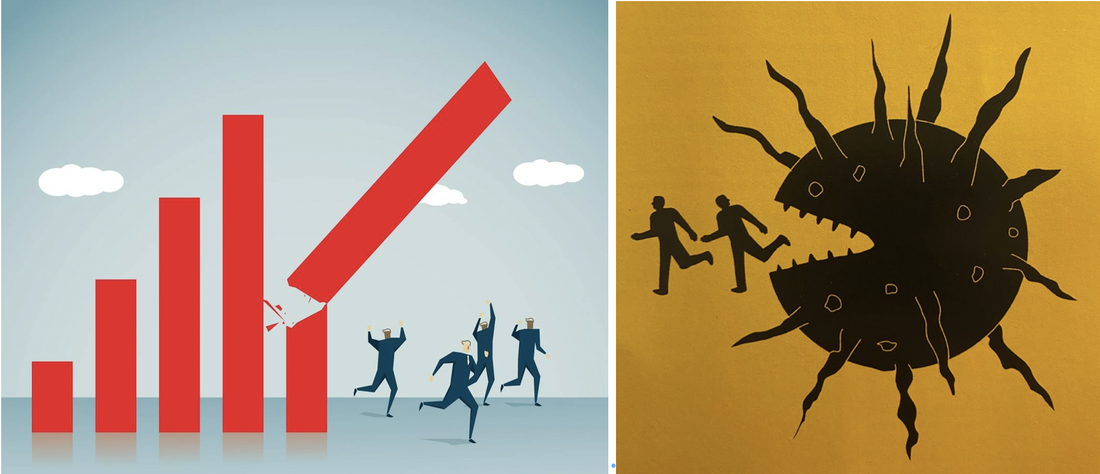Ecologist Jean Marc Jancovici explained during the first lockdown in 2020 that it takes such drastic lockdown measures for the next 30 years in order to conform with the Paris Climate Agreement, which aims at keeping global warming below 2 degrees Celcius.
Despite having conducted all the calculations and signed respective treaties, we do everything to keep our economies running. We rather purchase millions of masks, tests and vaccinations from the country where the virus erupted instead of producing regionally and spend at least EUR 12 million every week to test 1.1 million students twice a week, so that they can again sit classes in which they learn zero about how to deal with the situation ahead.
I am in the fifth month of returning to the society where I was born after having lived almost two decades abroad. Yesterday evening I watched for the first time since then local TV over ironing my shirts. A magazine called Thema reported on the implications of lifting the lockdown. Interestingly it interviewed only scientists who expressed great concern over the English and South African virus mutations and warned that removing the hard lockdown measures might cause a boomerang effect. Nobody discusses the etiology of this pandemic. Of course not. Science cannot afford to explain what cannot be measured.
Jancovici describes the problem our societies face in a simple way: "How do we get a job in a context where the economy is contracting, [...] ensuring everyone a form of optimism for the future?" According to him, the stagnation of the energy production already at work makes our model obsolete and should inevitably culminate in an economic recession. Economic recession is therefore considered by him as a fundamental reality we have to learn to deal with.
The "Shift Project" plans therefore to stop all public subsidies to certain industries like aviation. According to Jean-Marc Jancovici, the Air France group, which benefited from an aid plan of 7 billion euros, can no longer maintain its pre-crisis strategy. "There won't be as many planes flying," he concedes, lines are going to close and the number of flights will be reduced. These strategic shifts must occur for him in all sectors: mobility, energy, housing.
If all these industries go into a permanent recession, we need to ask once again, how people will earn their livelihoods. Back in 2016 I conducted research on this question from a different starting point and initiated this blog under the title mingong = migrant worker: what will people do if their jobs are being made obsolete by machines and software? And what should children learn if they will not find job as their parents did?
I then wrote: Increasing automation and computerization, in particular the recent development in AI research and application will lead within the next two decades to a total collapse of our labor markets, in particular the tertiary sector. In 30 years from now, we will live in societies where most menial and skilled work is executed by robots and algorithms and people are either without job or self-employed. The ongoing Chinese robot revolution will play a prominent role in this development, because China will be for the first time in the industrial revolution’s history pitcher instead of catcher. The Chinese industrial robot revolution will catalyze and exponentially accelerate the AI revolution.
I came to the conclusion that a collapse of labor markets can only be resolved by a new redistribution of wealth and the gradual agreement on a new social contract. This new social contract will have a guaranteed basic income as its central pillar. The current widely held concept of an unconditional basic income should be changed to a basic income which is condition to life long learning and community service.
The Economist writes this week that there are clear pandemic winners, namely silicon valley and China Inc. Tech giants are the big COVID-19 winners. I am surprised at the speed with which my predictions manifest themselves. The pandemic acerbates the already by Thomas Piketty and other economists explained unequal wealth distribution and pressures decision makers into either giving up on humanity or moving forward with a conditional basic income, that is a basic income which is subject to a sustainable lifestyle.
Follow up reading:
- Martin Ford: The Rise of the Robots – Technology and the Threat of a Jobless Future
- National Development and Reform Commission Robotics Strategy: 机器人产业发展规划(2016-2020年)发布
- Switzerland put the unconditional guaranteed basic income as the planet’s first country to a referendum on June 5, 2016. Detailed information about the socio-economic implications can be found on the website of the organizers.
- Thomas Piketty: Capital in the 21st Century
- Myself: On Pandemics, Pigs and Our Children.
